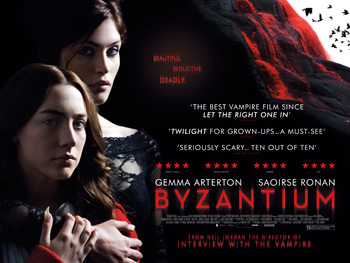Byzantium ***
 Think ‘Twilight on the English Rivera’ but all the more seedier and desolate, Neil Jordan style. The director who admits to being ‘fascinated by monsters and monstrous people’ shows a sensitive side to the plight of the creatures of the night in his latest film Byzantium, taking note of the recent appeal of vampire films for female audiences after his male-dominated Interview With A Vampire back in 1994, but not necessarily following all the traditional attributes of the genre.
Think ‘Twilight on the English Rivera’ but all the more seedier and desolate, Neil Jordan style. The director who admits to being ‘fascinated by monsters and monstrous people’ shows a sensitive side to the plight of the creatures of the night in his latest film Byzantium, taking note of the recent appeal of vampire films for female audiences after his male-dominated Interview With A Vampire back in 1994, but not necessarily following all the traditional attributes of the genre.
Gone are the tantalising romantic notions of erotica to be distorted into brazen carnal sexuality and the use of female ways to survive in a current-day environment – as ever with Jordan’s Catholic spin of bodily sin injected and a little social economics, reflecting today’s gloomy austerity. However, the familiar bond is still very much alive in this, complete with two empowering performances from Gemma Arterton and Saoirse Ronan.
Two mysterious women – creative, sensitive Eleanor (Ronan) and the wilder, older Clara (Arterton) flee to a coastal town, hiding a dark bloody secret. They take shelter within the town’s underground trade routes, familiar to both, hiding from those who seek to destroy them after an ancient right of passage is broken.
In film theory, independent women usually get punished for their wayward ways, especially where sexuality is explored. Along the same tropes, Jordan’s attempt at Gothic suggests no good will come from the antics of his female leads here, however endearing and conscientious Eleanor is deemed to be. That said there is apparent empathy, where the director again masterfully creates subtle moods between the pair that are sensed, without having to explore them as part of the discourse. He also champions these females in the end, making an altogether compelling feminine affair and pouring scorn on those who deny female dominance, or indeed, that of change within stubborn institutions.
Ronan’s ever-considered performance always makes her an exciting watch as she explores the character’s depths, choosing to inject principles into the standard vampire feeding affair and prompting comment on the ethics of euthanasia. In a way, Jordan tries too hard to flesh out more avenues of interest than the normal bloodsucker behaviour which kind of works, but at the same time, gets diluted as the plot moves between extravagant costume drama and present-day social despair essay. Arterton comes across as slightly uneasy in the downtrodden vice girl role, but soon regains familiar ground when the fight is on and she can be feisty once more. Nevertheless, both actors are compelling to watch and compliment each other nicely.
The males come off the worse in this, with no titillating whiff of Cullen sensuality, ranging from a sickly waiter (Caleb Landry Jones) who Eleanor adopts as a pet project and a way of redeeming herself and Clara, to a miserable, pushover of a guesthouse proprietor (Daniel Mays). Jonny Lee Miller’s vampire character Ruthven poses an intriguing, alpha male threat that fizzes out as the pursuit draws to a climax. There is even the suggestion of a sequel as the story is left, should Byzantium succeed and grab the vamp fan’s imagination. However, without a decent dollop of lust and more of a grim social picture, this could be a hard sell to the ready-made audience of Twihards, and not dark enough or steeped in enough folklore to entice serious Gothic enthusiasts either, even with the promise of an attractive and solid female casting.
3/5 stars
By @FilmGazer